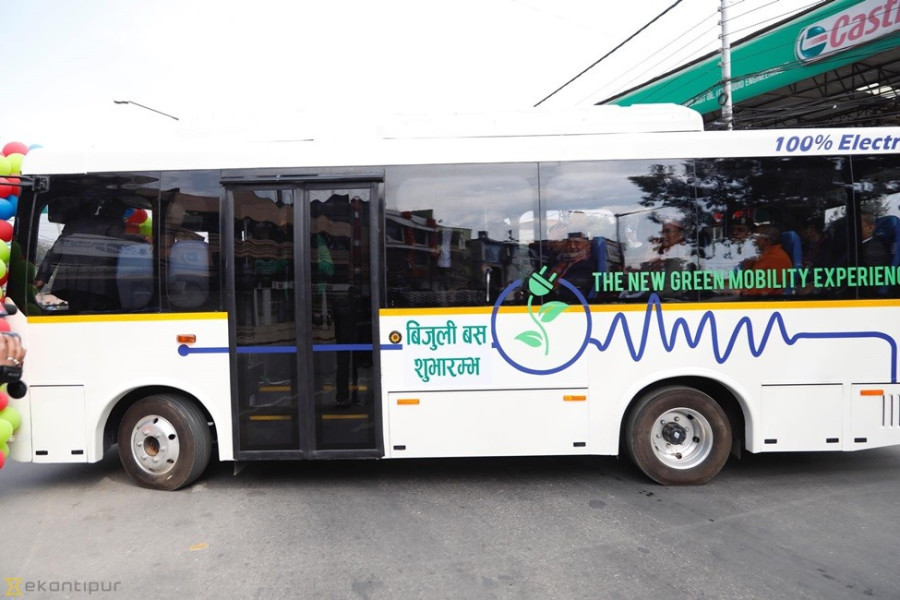National
Call to prioritise promotion of electric vehicles
At the time when the government is working to finalise the annual budget for the upcoming fiscal year 2019-20, a group of environmentalists and green transport promoters have called for a clear vision in the outlay for the promotion of electric vehicles in the country.
Chandan Kumar Mandal
At the time when the government is working to finalise the annual budget for the upcoming fiscal year 2019-20, a group of environmentalists and green transport promoters have called for a clear vision in the outlay for the promotion of electric vehicles in the country.
The environmentalists and experts also blamed the government for failing to come up with concrete plans to promote electric vehicles even though it has laid stress over the years through various policies, including the recently presented government’s policies and programmes, on introducing environment-friendly vehicles in the Capital and other major cities of the country.
Pointing out little progress achieved towards the satisfactory promotion of electric vehicles in the country, in a joint statement, Nepal Forum of Environmental Journalists (NEFEJ), Clean Energy Nepal and Electric Vehicles Association of Nepal said that the new budget should explicitly mention how the private sector can be brought on board for increasing the number of clean vehicles and how they can be supported for the purpose.
They urged the government to ease various issues—problems faced by battery-powered three-wheelers and electric vehicle importers—and address other concerns by allocating adequate budget for implementation of the past commitments and recent policies and programmes.
“The government should work towards effectively implementing its prior policies through the new budget so as to promote electric vehicles in the public transport sector,” said Bhushan Tuladhar, chairperson of the Clean Energy Nepal.
“We all are aware of the deteriorating air quality in Kathmandu Valley which has made the capital city one of the most polluted cities in the world,” Tuladhar added. “As vehicular emission is a major contributor to air pollution, there is no other option than to promote electric vehicles. These clean energy vehicles are not only a means of transportation like diesel-powered buses but also a sustainable way to bring down pollution levels.”
The environmentalists praised government’s policy of slashing down import tax on small electric vehicles to 10 percent, contributing to the rise in the number of such vehicles in the country. However, they criticised the government for not extending similar subsidies to large electric vehicles like buses for public transportation which —the move that could bring down the emission levels greatly and at much lower operation cost in the long term.
With the current import tax, the electric vehicles are five times more expensive than fossil fuel-driven buses, making it a one-time expensive investment, which also keeps the private sector away from investing in electric vehicles for the public transportation sector.
The Electric Bus Pre-Feasibility Study report, prepared by Global Green Growth Institute (GGGI) under the Electricity Mobility Programme, showed operational and financial advantages in switching to electric buses in comparison to fossil fuel-run buses.
The report has estimated that a diesel-powered bus can cause damage worth Rs25 million in 10 years of its operation.
The Environment-friendly Vehicle and Transport Policy (2014) has aimed to reduce greenhouse gas emissions from the transport sector and increase the share of electric vehicles by up to 20 percent by 2020.
“For achieving the target, there should be the fast adoption of electric vehicle model defined for the conversion of diesel-powered vehicles into electric ones,” said Umesh Raj Shrestha, chairperson of the Electric Vehicles Association of Nepal. “There should be subsidy on imports of vehicle parts, conversion kits and equipment required to assemble electric vehicles inside the country, especially zero tax on lithium batteries.”
They also stressed the need of enough charging stations, formation of various committees as envisioned in the policy, infrastructure development for recycling and reusing old batteries, applying market mix strategy for plying electric vehicles in all three—primary, secondary and tertiary—routes in the Valley as divided by the Kathmandu Sustainable Urban Transport Project.
“For narrow streets, electric vehicles like microbuses, Safa Tempos and taxis can be useful. Also, all the taxis operating in the Valley should be only electric powered as they don’t have to travel long distances and the battery can provide the required mileage for the day,” said Shrestha. “We should completely stop importing diesel buses now. If we don’t stop it now, they are likely to stay on the roads and continue to pollute the environment at least for the next 20 years.”




 9.7°C Kathmandu
9.7°C Kathmandu














